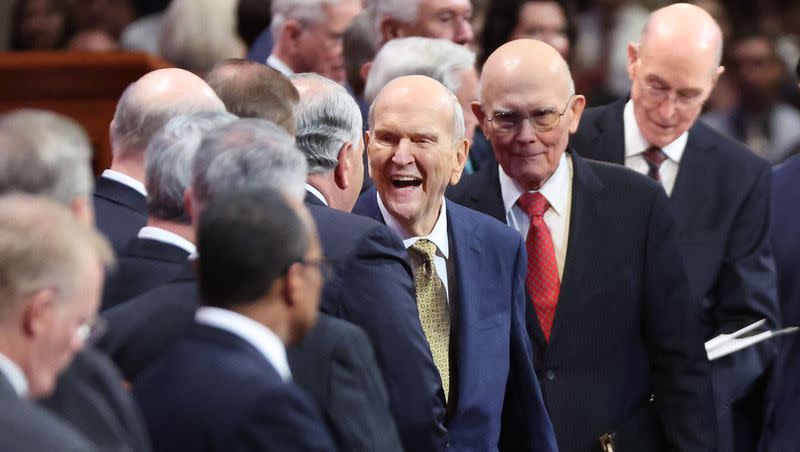Opinion: ‘Contention never leads to inspired solutions.’ How our words can motivate violence or love

- Oops!Something went wrong.Please try again later.
Tami Pyfer’s phone started blowing up as President Russell M. Nelson spoke in the Sunday morning session of general conference of The Church of Jesus Christ of Latter-day Saints. Nelson’s talk on decreasing contention is right up Pyfer’s alley as she works to increase the dignity in political speech. Pyfer is the chief of staff and director of operations for UNITE, the national organization behind The Dignity Index.
President Nelson focused his talk on decreasing contention. “Civility and decency seem to have disappeared during this era of polarization and passionate disagreements. Vulgarity, fault-finding and evil speaking of others are all too common.”
President Nelson continued: “I am greatly concerned that so many people seem to believe that it is completely acceptable to condemn, malign and vilify anyone who does not agree with them. Anger never persuades. Hostility builds no one. Contention never leads to inspired solutions.”
The Dignity Index is one organization that, at its heart, is all about learning how to talk about issues without devolving into personal attacks. Donna Hicks, who wrote “Dignity: Its Essential Role in Resolving Conflict,” says that dignity is “the glue that holds all our relationships together,” and is the “mutual recognition of the desire to be seen, heard, listened to, and treated fairly; to be recognized, understood, and to feel safe in the world.”
The Dignity Index ranks political speech on a scale of 1-8, with one being the lowest. On the positive side, level 6 finds speech indicating a desire to talk with people who have differing views. Level 7 wants to “fully engage” with the other side and level 8 says “I can see myself in every human being. Everyone has inherent worth.” Yes, even “those guys.”
On the other hand, level 3 attacks the other side’s moral character: “We’re good, they’re bad.” Level 2 accuses the other side of not just “being bad,” but of promoting evil. Finally, level 1 is both a feeling that “the other side” is less than human and it calls for violence. For example, writing or saying something like “They are destroying everything we value. It is our moral duty to destroy them first.” It is contempt in action.
Arthur Brooks also speaks and writes on contempt. Contempt, he says, is the combination of anger and disgust and in the words of 19th-century philosopher Arthur Schopenhauer, contempt “is the unsullied conviction of the worthlessness of another.” Manifestations of contempt can look like sarcasm, sneering, hostile humor, bullying, recrimination and eye-rolling. Can you remember the last time you rolled your eyes at something “they” said? I can, and it wasn’t that long ago. I’m a work in progress.
Related
Brooks wrote in The New York Times in 2019 that America suffers from “motive attribution asymmetry,” or the notion that your ideology is based in love while your opponent’s is based in hate. Researchers found almost a decade ago that the “average Republican and the average Democrat today suffer from a level of motive attribution asymmetry that is comparable with that of Palestinians and Israelis.”
When Brooks spoke at BYU graduation in 2019, he quoted the words of President Nelson. Then-Elder Nelson gave a 2002 general conference talk titled “Blessed Are the Peacemakers.” He said, “Hatred among brothers and neighbors has now reduced sacred cities to sites of sorrow.” Further, he said, “We should be personal peacemakers,” a message he echoed on Sunday, more than 20 years later.
Of course, one of the major questions is how. How do we decrease contempt and contention and increase peacemaking? President Nelson says charity, the pure love of Christ, is the answer. So does Brooks. The next question, for me at least, is how do you move from feeling contempt and disgust to feeling charity? That can feel like a pretty big leap. One step is to change how we speak to and about others, as advocated for and modeled by the Dignity Index.
Another is to turn toward the person (or group or nation) that we are in conflict with. It’s about humanizing the other person, and as Chad Ford says, it is choosing “we over me.” Ford is the author of “Dangerous Love: Transforming Fear and Conflict at Home, at Work and in the World” and a professor of intercultural peacebuilding at BYU-Hawaii.
Related
Additionally, Ford is a senior consultant and facilitator for the Arbinger Institute and an international conflict mediator. Ford recommends three principles to cultivate “dangerous love.” The first is seeing people as people. As mentioned by Hicks, everyone needs to feel seen and heard. The second principle is to turn first. Turn toward people with whom you disagree — get intensely curious about them. When disagreements arise, ask yourself, “What don’t I understand?” Keep asking that question. Third, invite collaborative problem-solving. Ford says that in conflict, we typically want to be right. We want validation that “our way” is the way. Rather, he says we need to seek for solutions that put “we over me.”
For Pyfer, this past weekend’s general conference brought several messages of peacemaking and unity. But when President Nelson spoke, she cried. “I wanted to shout yes! yes! yes!” she said. “It was this beautiful convergence of my religious beliefs, my spiritual work and my professional life — a validation of this work on dignity and unity that I’ve poured my heart and soul into these past few years. More than anything, these words were like a huge ray of hope — which I think we all need right now. I am so grateful.”
Holly Richardson is the editor of Utah Policy and a member of the advisory council for The Dignity Index.

